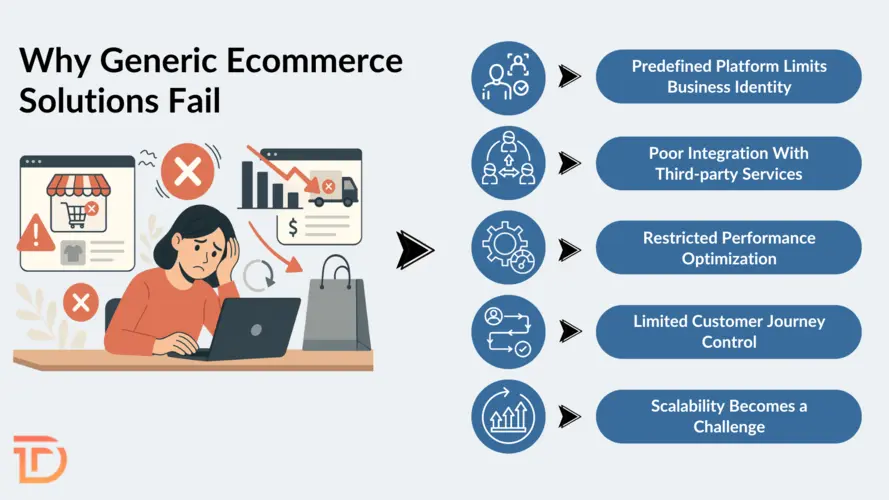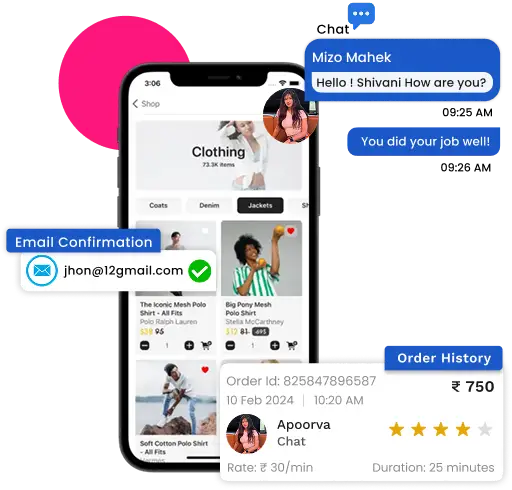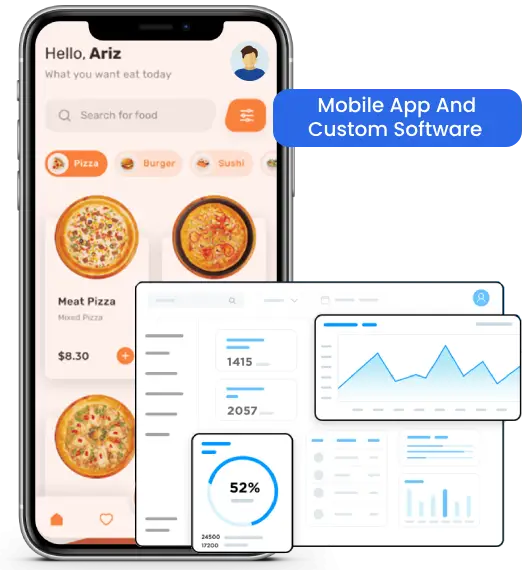Most online stores begin with a website, but those relying exclusively on web platforms frequently encounter a sharp disparity between mobile traffic and actual mobile conversions. Consumers often browse their phones, yet the bulk of purchases happen on desktops. This inconsistency reflects a significant revenue gap, driven not by lack of interest but by subpar mobile experiences. While websites may be mobile-friendly, they rarely offer the seamless performance, intuitive interface, and personalization users expect on smartphones. A dedicated custom ecommerce app can bridge this divide, aligning user behavior with transactional efficiency. This shift isn’t about keeping up anymore; it’s about leading in a competitive digital marketplace. In this blog, we will discuss the latest ecommerce market trends, strategies for increasing e-store revenue, the pitfalls of generic platforms, and shifting consumer behavior in 2025.
Increase E-Store’s Revenue with a Custom eCommerce App
An ecommerce app does more than extend your e-store’s presence to mobile— it unlocks layers of value that web platforms alone cannot deliver. Revenue growth is not only about attracting customers but also about deepening engagement, simplifying conversion, and building long-term loyalty. The following unique strategies show how a custom ecommerce app can directly increase e-store’s revenue and profitability:
- Behavioral Funnels for Segment-Specific Selling: Personalized funnels based on in-app user behavior enable targeting with unmatched precision. Instead of generic campaigns, users see specific product types or price ranges tailored to how they browse— significantly improving conversion rates and helping to increase e-store’s revenue.
- Interactive Merchandising Through Motion Design: Apps can incorporate motion-based product displays and interactive elements that simulate tactile experiences. This immersive presentation enhances product appeal and makes digital browsing feel more engaging, which motivates faster purchase decisions.
- Integrated Upselling Through Intelligent Prompts: Custom apps can analyze what users view and buy in real time, offering relevant upgrades or add-ons exactly when interest peaks. Smart upsell prompts appear naturally during browsing or checkout, improving average order value without disrupting the experience.
- Optimized Re-Engagement Through Session Memory: Apps remember where users left off— even if the session ended hours or days ago. This ability to resume a cart, product view, or search query effortlessly removes friction and increases the likelihood of returning users completing transactions.
- In-App Referral Mechanics for Viral Reach: Built-in sharing options and referral rewards turn loyal customers into active promoters. With a few taps, users can send personalized product links, or discount invites to their network, organically growing traffic while boosting sales through peer influence.
- Adaptive UI Based on Customer Preferences: Custom apps can reshape their interface based on individual preferences such as layout choices, recently used features, or favorite categories. This evolving UI offers a comfort zone for each user, building a familiar journey that feels intuitive and encouraging.
Why Doesn’t a Generic Solution Work Anymore for an Ecommerce Business?
Standard ecommerce templates often fail to address nuanced business needs. Here’s why off-the-shelf solutions are no longer enough:

- Predefined Platform Limits Business Identity: Generic platforms force every business to look and function the same way. There’s minimal room for differentiation, which makes it difficult for brands to establish unique identities or create memorable user experiences.
- Poor Integration With Third-party Services: Basic ecommerce platforms offer limited integration options. Businesses looking to streamline operations with CRM tools, inventory systems, or shipping APIs face barriers and need additional workarounds.
- Restricted Performance Optimization: Prebuilt solutions rarely allow optimization for speed or memory. This often leads to slower loading times, especially on mobile devices, resulting in abandoned carts and lost sales.
- Limited Customer Journey Control: Without flexibility, it’s impossible to adjust the shopping flow based on data insights. You can’t refine checkout processes, personalize navigation, or guide users effectively through the funnel.
- Scalability Becomes a Challenge: As your customer base grows, your platform must keep up. Generic systems often buckle under increased traffic, requiring costly upgrades or full migrations to a new platform.
How Custom Apps Outperform Web-Only Stores?
Mobile apps are designed for speed, engagement, and performance. Here’s how custom ecommerce apps offer substantial advantages:
- Faster Load Times and Smoother Navigation: Apps load instantly and allow users to shop without interruptions, which reduces bounce rates and improves retention. Transitions between pages and products are also much quicker and more intuitive.
- Offline Functionality: Custom apps can cache data, enabling browsing even without internet access, a feature web stores cannot provide. This empowers users to view saved products and content anytime, anywhere.
- Push Notifications for Timely Engagement: Promotions, updates, and reminders reach customers directly, increasing chances of revisits and purchases. These alerts can be automated and personalized based on browsing or shopping history.
- Seamless Integration With Device Features: Apps use mobile capabilities like cameras for AR, location tracking for local offers, and biometrics for login and payments. This creates a highly convenient and interactive shopping experience.
- Improved User Retention Through Loyalty Programs: Gamification and exclusive rewards within the app can drive recurring business more effectively than browser-based platforms. Personalized achievements and in-app challenges foster stronger brand attachment.
- Better Conversion Rates: Users tend to complete purchases more frequently on apps due to personalized UI and a streamlined checkout process. Fewer form fields and stored payment methods make transactions effortless.
- Superior Analytics and User Tracking: Apps collect richer data, enabling businesses to understand micro-behaviors and continuously improve the user experience. Heatmaps, session recordings, and event tracking add deeper insights.
- Enhanced Security and Threat Response: Custom apps are built with unique codebases and advanced encryption, which reduces vulnerability to cyberattacks. They also enable faster patching, secure payment flows, and full compliance with industry regulations like GDPR and PCI DSS.
How Consumer Behavior Has Shifted to Ecommerce in 2025?
Shoppers in 2025 are engaging with ecommerce in radically different ways. Mobile is not just a channel; it’s the primary shopping arena. Consumers expect ultra-fast browsing, real-time personalization, instant customer support, and secure one-tap payments. Patience for clunky interfaces or slow websites has disappeared entirely.
Buyers demand experiences that adapt to their behavior. Whether it’s AI-generated product recommendations or dynamic discounting based on engagement history, users respond better when digital environments recognize their preferences. Voice search, AR previews, and conversational interfaces have also entered the mainstream, shaping how users interact with e-stores.
This behavioral evolution reflects deeper trust in mobile ecosystems. Users now make high-value purchases on smartphones, from electronics to furniture, because they feel confident in the app’s ability to deliver value and security. Trust and speed have become the new currency for online transactions.
Ecommerce Market Size Report
The global ecommerce market has experienced extraordinary growth, with figures that confirm the undeniable dominance of mobile and online transactions. According to the Grand View Research Ecommerce Market Size Report, the global ecommerce market was valued at USD 16.6 trillion in 2022. It is projected to expand at a compound annual growth rate (CAGR) of 27.38% from 2023 to 2030. Asia Pacific alone accounted for over 60% of the global revenue in 2022, reflecting increased smartphone usage and digital literacy.
The report also highlighted that mobile commerce held a significant share of total ecommerce transactions, and this share is forecast to grow steadily. Consumer electronics, fashion, and home appliances topped the list of mobile-driven purchases. More than 78% of digital buyers globally use mobile devices for their transactions. These statistics reinforce a clear message: the future of ecommerce lies heavily in mobile platforms, and merely having a responsive website will not suffice.
Way Forward
A custom ecommerce app is the key to unlocking real revenue potential in today’s mobile-first world. Businesses that rely solely on websites or generic platforms continue to lose ground, especially among younger audiences who live entirely through their phones. Adapting to modern consumer expectations requires more than surface-level changes—it demands a complete embrace of personalization, performance, and security, all of which are embedded into a custom app from the start. The journey to increase e-store’s revenue begins with reimagining how customers shop, engage, and purchase. Every moment spent inside a dedicated app strengthens brand value, builds trust, and improves the chance of conversion. Over time, this approach fosters not just higher traffic, but a loyal and profitable customer base.
Ready to Build Your Custom Ecommerce App?
Dreamer Technoland can help you transform your conventional web store into a future-ready mobile commerce powerhouse. Our in-house team specializes in custom ecommerce app development, creating tailor-made applications that align with your goals and exceed user expectations. With seamless integration, optimized design, and exceptional security, we ensure your app not only functions beautifully but also scales with your business.
Boost your e-store’s revenue today with a custom ecommerce app that puts performance, personalization, and profit first. Connect with us and take the next big step in digital commerce.







